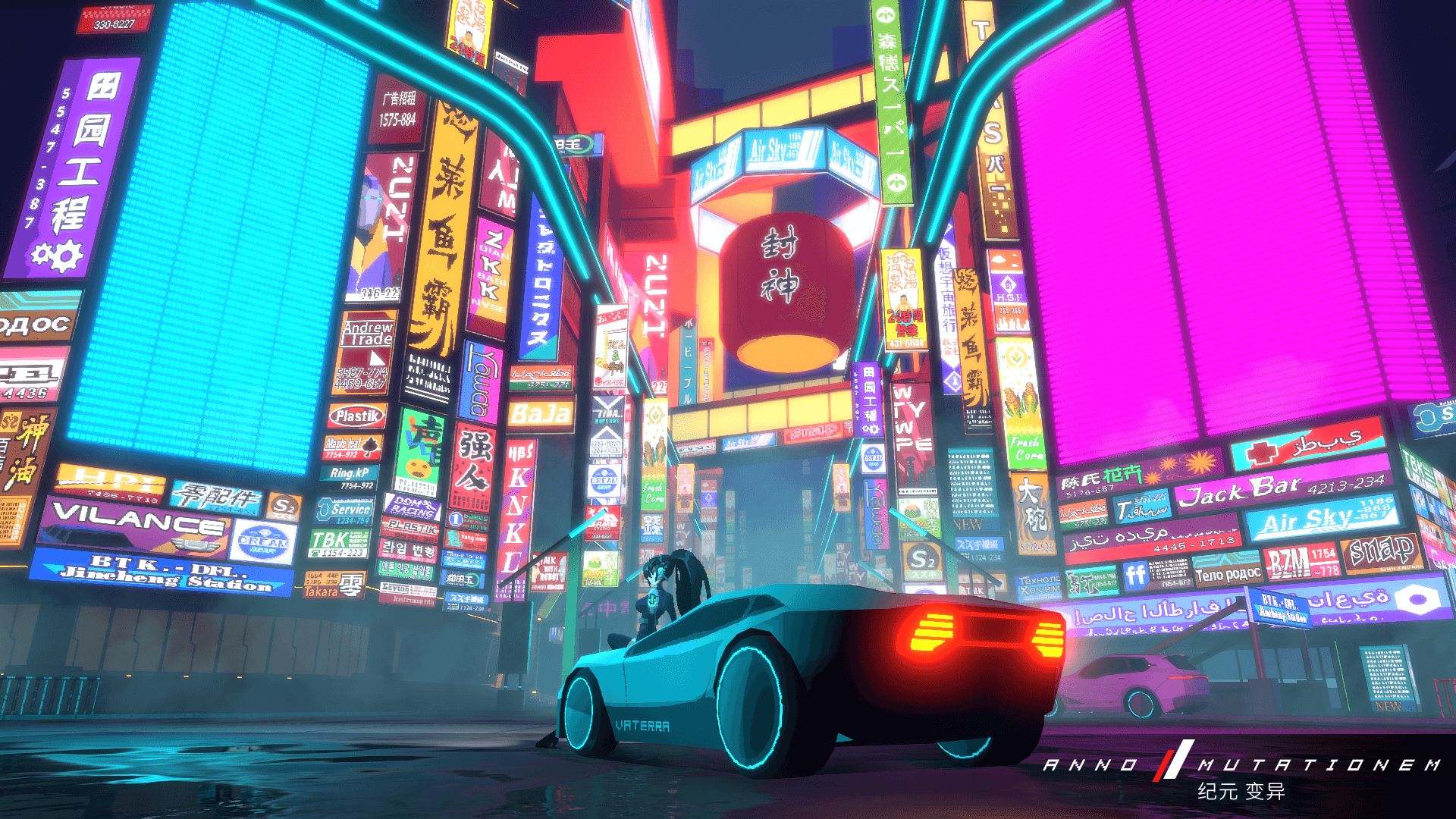Looking like the love child of Xenogears and Cloudpunk, Anno: Mutationem is a 2D on 3D cyberpunk adventure through the gritty streets of Skopp City. Everything you’ve come to expect from the genre is here; flying cars, androids, neon advertisements and too much rain. I hope these future cities have good sewer systems. There’s rich mega corporations and poverty-stricken streets, and its all packaged as a dystopia that for some reason plenty of us actually want to live in.
In Anno: Mutationem its all seen through an anime lens, evoking more Ghost in the Shell than 2077. Developed by Beijing based Thinking Stars and part of Sony’s China Hero Project, Anno: Mutationem has been top of our hype list for a while, so it’s great to see that despite delays it is releasing on PlayStation and PC this week.
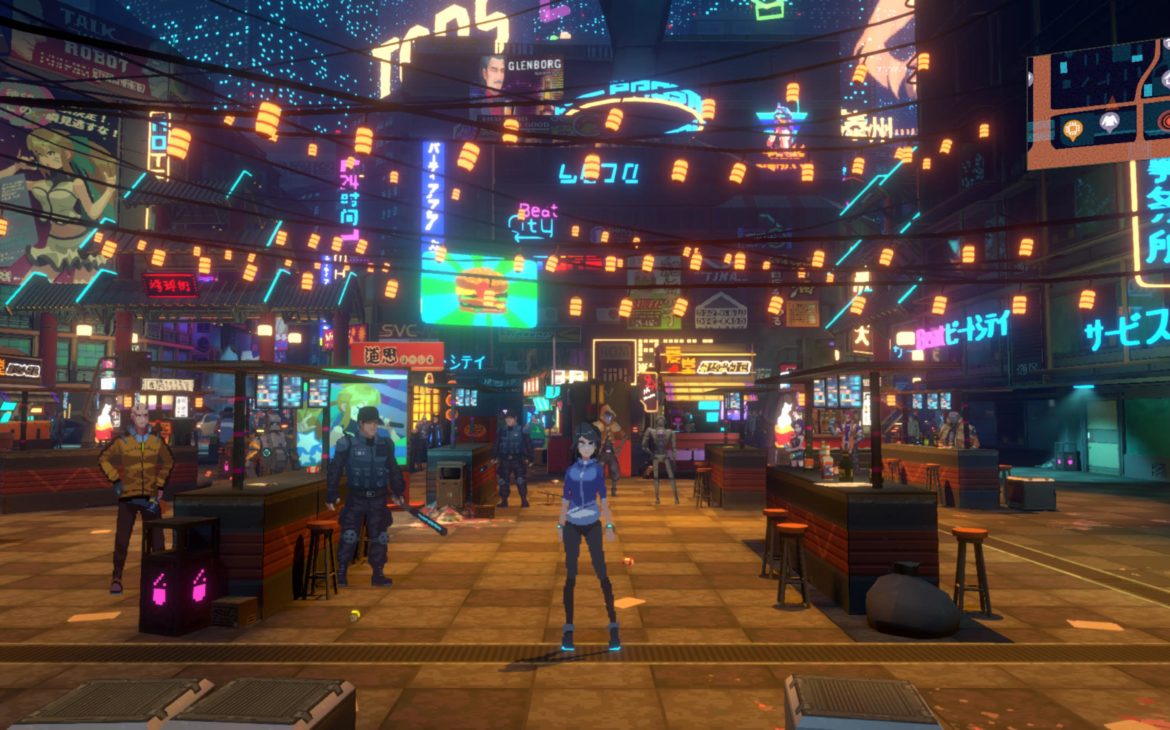
You play as Ann Florez, a semi-amnesiac young woman who can handle herself in a fight. She seems to be the sole operator of a Private Investigation service, that solves crimes and issues outsourced to her by the local police along with her live-in virtual AI and girlfriend(?) Ayane. At first I wondered if Ayane was a reclusive friend who maintained her outdoor relationships via a drone projection. By around halfway through I was convinced she was a direct lift from Blade Runner 2049; the equivalent of Joi, an AI companion liberated via a remote drone to join Ann on her investigations. I’ve now finished and I still don’t know – I must have missed some exposition somewhere.
Not to get too detailed too quickly, but this illustrates one of the major problems with Anno: Mutationem – narrative. The story struggles with exposition throughout; giving you necessary context, explaining the point of going to certain places, or the reason behind your actions. It’s more concerned with what sexy outfit you’re going to wear, than explaining what’s happening.
In the first half hour everything just kind of starts, but without explanation. You have a disease called Entangelitis (which sounds interesting) but there’s no explanation, you go to the doctor about it, but he doesn’t explain anything either, just gives you a tutorial on combat instead. You have errands to run, people to speak to, but no explanation, at this point, that you’re even a private investigator. Don’t get me wrong, I don’t want all the answers, but just the symptoms would have been enough, or what the disease is doing to Ann – there’s no tension because I don’t know what it’s doing to her.
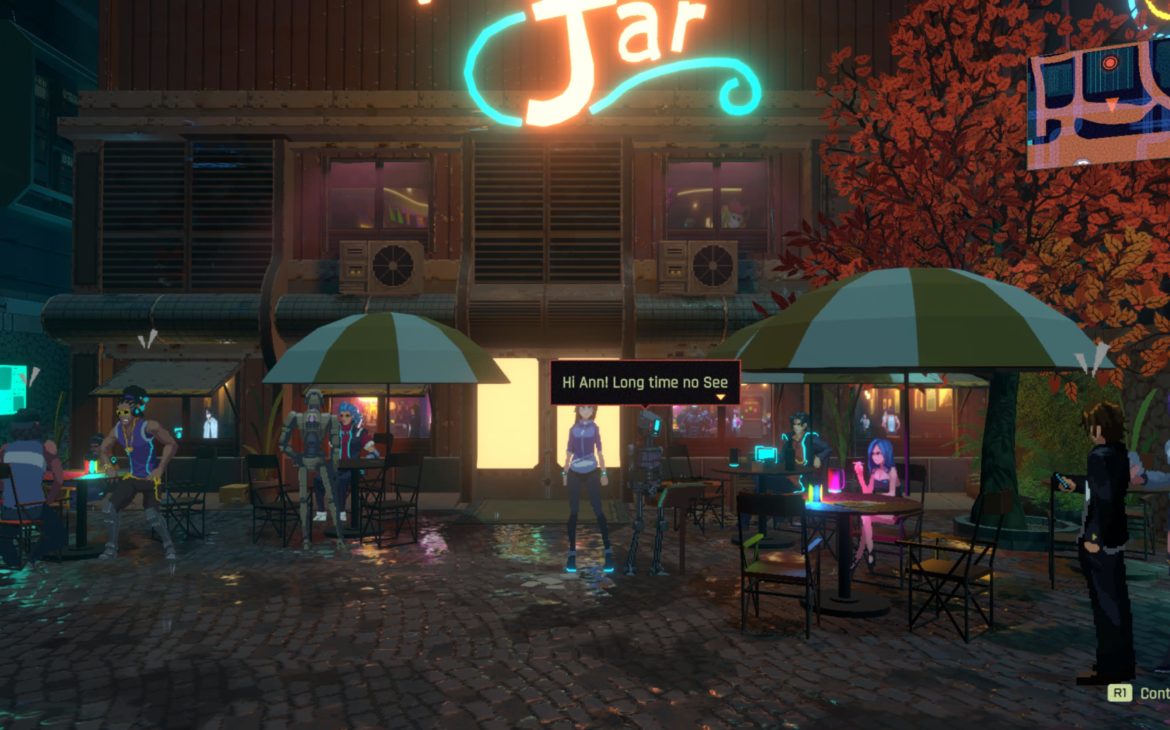
You just sort of stumble into the story after a while. Ann just decides to go home to the bar run by the family Florez, where you meet her sister and her now robotic father. Suddenly there are thugs looking for your missing brother, and we have a story cooking! Got to be some family secrets, right? How did the father become a robot? Where’s the brother Ryan run off to? How is it all connected with Ann’s illness?
Well yeah, that is the plot, but just as quickly as it starts, it’s thrown out and you’re a PI again dealing with a murder in your own high-rise. Then that plotline is abandoned in the space of ten minutes in favour of searching for your brother and the cure for your unexplained disease. This veering between tasks is in some ways the way we play modern video games, but when this is the main questline, it feels jarring.
Without spoiling too much, the story and action takes you over the city’s rooftops, through its clubs and seedy alleys, deep underground where the underclass of Mekanika sufferers live, and beyond, on a quest to find your brother and control your illness. The plot is unhoned and raw, like a first draft. It doesn’t seem to know how to get the best from its subject matter. It’s set in a cyberpunk world, but it rarely deals with cyberpunk issues; beyond the underclass and poverty divide it’s really just about high tech stuff – there’s little about corporations or corruption, advertising and existentialism. It’s not got the chops of Blade Runner or the realised world building of Cyberpunk 2077. I was at least constantly surprised by the plot, I just wasn’t very often satisfied by it.
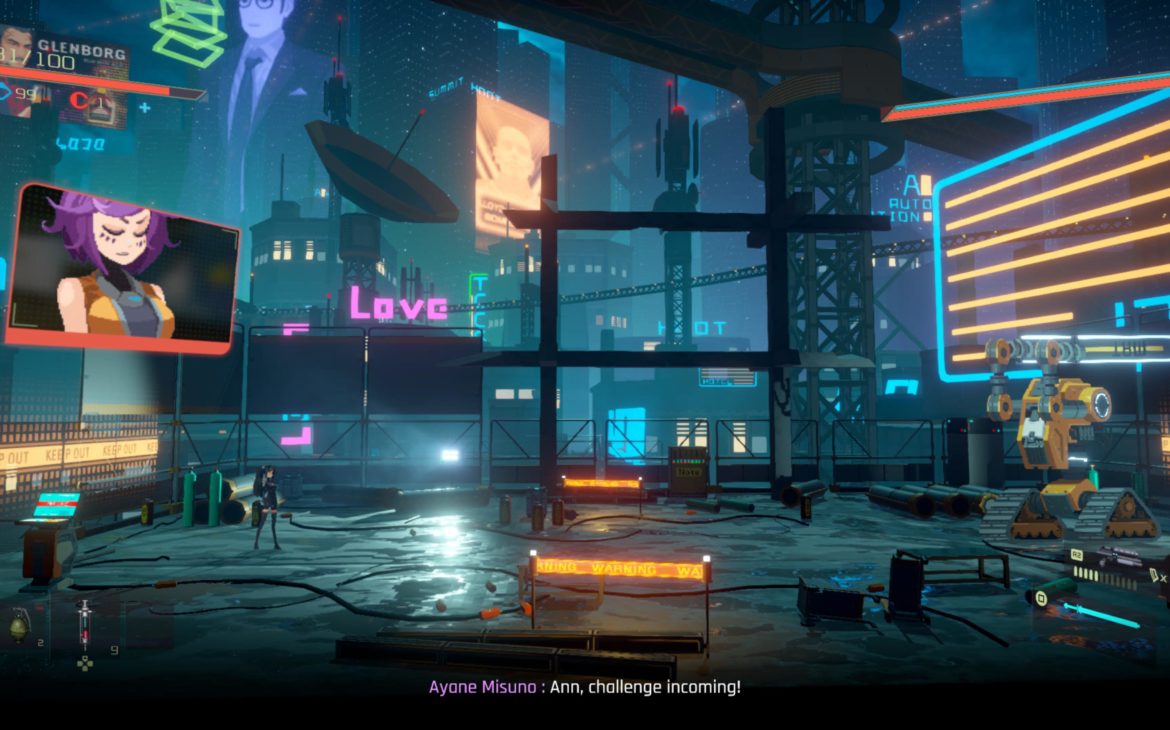
Skopp City is split into four+ hubs, though they all have their own names. Four world hubs for a game that looks like this – it feels big and ambitious. However just a few moments of exploration beyond the street or two the plot takes you to, will have you running up against virtual barriers in no time. The hubs are not as big as they look. This is not an open world in any sense, and please don’t be lulled into thinking it is.
Gameplay in Anno: Mutationem revolves around talking to NPCs, running about picking up items and solving a few quests, and combat. The main plot may be lacking, but it’s much more interesting than the handful of quests in each hub area – fetch quests and one or two missing persons quests that get a little more involved. It’s still follow-the-quest-marker from one point to the next, there’s barely ever any reason to solve something or decide something for yourself. Only one instance I can recall, where I decided who to blame out of two suspects.
You’ll transition from 3D exploration to 2D side-scrolling combat screens pretty seamlessly throughout the game. You can’t use combat abilities in the 3D areas, and there are rarely items in the 2D sections, but it is what it is, and I liked the overall feel of the world and the places you go. You will collect a lot of random broken mechanical parts (read useless junk items) barely any of them of use beyond to sell or dismantle.
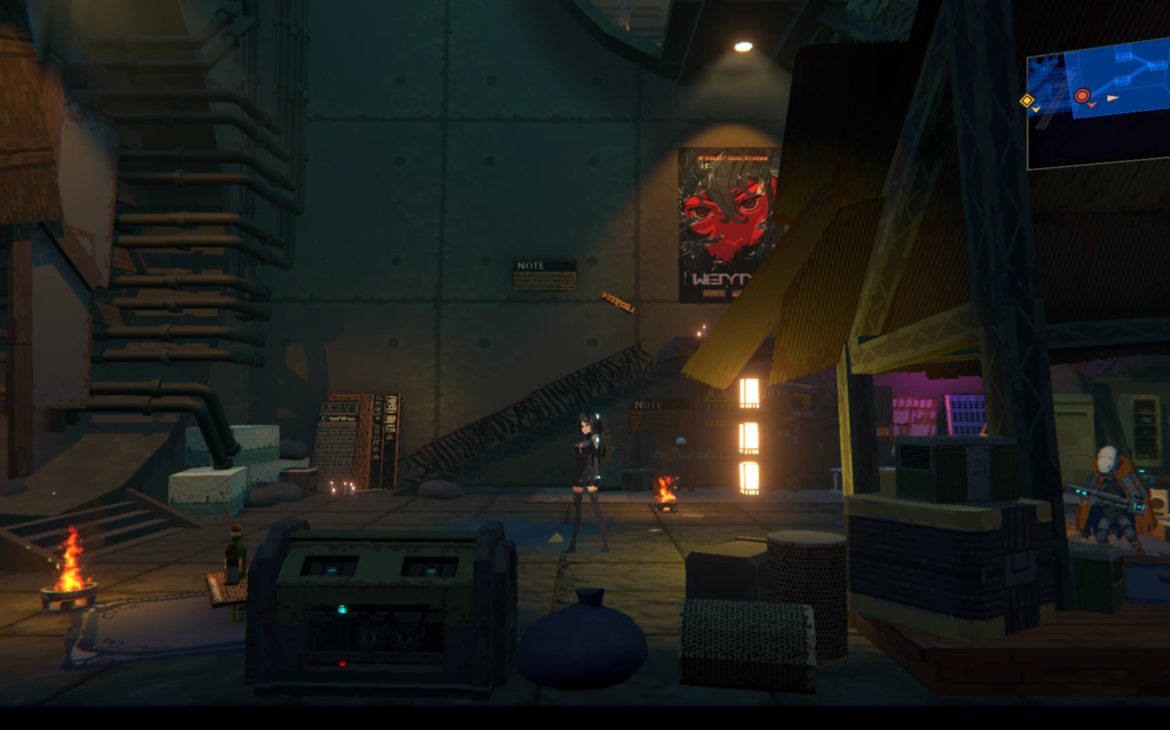
Dismantling means there’s crafting too, out of the materials you’ve collected. However the balance here is all off – you might have enough to afford one maybe two weapon upgrades over the course of the entire playthrough, I didn’t find enough junk even for one basic update to my favourite weapon type. It’s a lot of unnecessary complexity and more systems than a game this size and length needs. Instead a series of basic upgrades would have been welcome, or much cheaper crafting options.
There’s a point where you descend underground for two back-to-back dungeons, and around 3 hours of playtime. By the end of this, your weapons are doing very little to the basic enemies and bosses take a very long time to whittle away at. During this whole period, there’s no way to go back to the city and enhance your gear so you’re stuck with poor stuff. And when you finally do get back you can’t afford the prices or crafting materials.
It was a nice touch that there was a Va11-Ha11A-esque minigame where you mix drinks behind a bar although it was pretty difficult to score high. The other hacking minigame, and suddenly being thrown into combat scenarios at a moment’s notice, were less welcome.
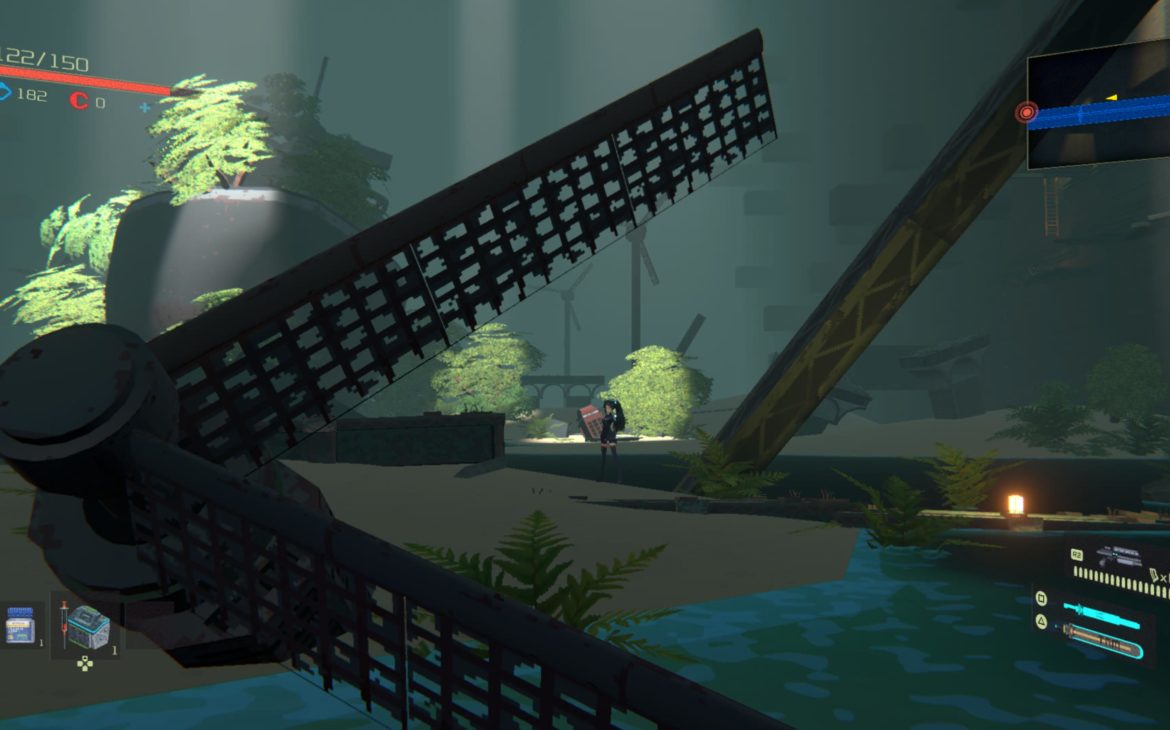
Let’s talk about the combat, because it’s got some of Anno: Mutationem’s highest highs and lowest lows in it. Combat happens only on the 2D plane. It’s slick and fast, but at the same time pretty simple. You have a sword or double-sword combo and a few moves, a great sword for tackling shields, and an auto-aiming firearm. You can shield yourself and get a moment to parry, and the rest is dodge-rolling through attacks, and behind enemies to avoid their hits and then wailing on them from behind. It’s both too simple to be all that interesting, but fast enough that for the most part it’s enjoyable. Or over quickly.
Other player’s may find the parry function suits them better, but I never quite got the timing down for that. Ala recent combat evolution, you often whittle away at a shield/poise meter and then get the chance to hit with a super attack. And I mean super – it can take out half a boss’ health easily.
And bosses are where the combat seemed to fail for me. Due to the aforementioned lack of balanced upgrading, and the expense of it either through crafting or money, you spend 90% of the game underpowered, whittling away at hit-sponge bosses for far too long. I could get into the pattern of a boss and five minutes, ten minutes later still be dodging, punishing and then repeating the same process, waiting for that glorious moment when you could break a shield and decimate the health bar. I think it’s been built deliberately like this, but it’s not that much fun.
Normal enemies aren’t the same level of hit-sponge, but there the issue is they are quite generic and rarely have more than two attack patterns. Again it’s all a case of balancing. At the moment the game is too easy in the main, and then dull, repetitive, and difficult in boss encounters.
Last thing to say on combat is that later on, when you do find clues to Ann’s illness, you will unlock some pretty intense latent powers. These can help restore health and put the hurt on even bosses, so they were welcome when they arrived. Make sure you listen when it tells you how to throw grenades because they are essential in some bosses, and you don’t want to flail about not knowing how to progress because you can’t throw something like I did.
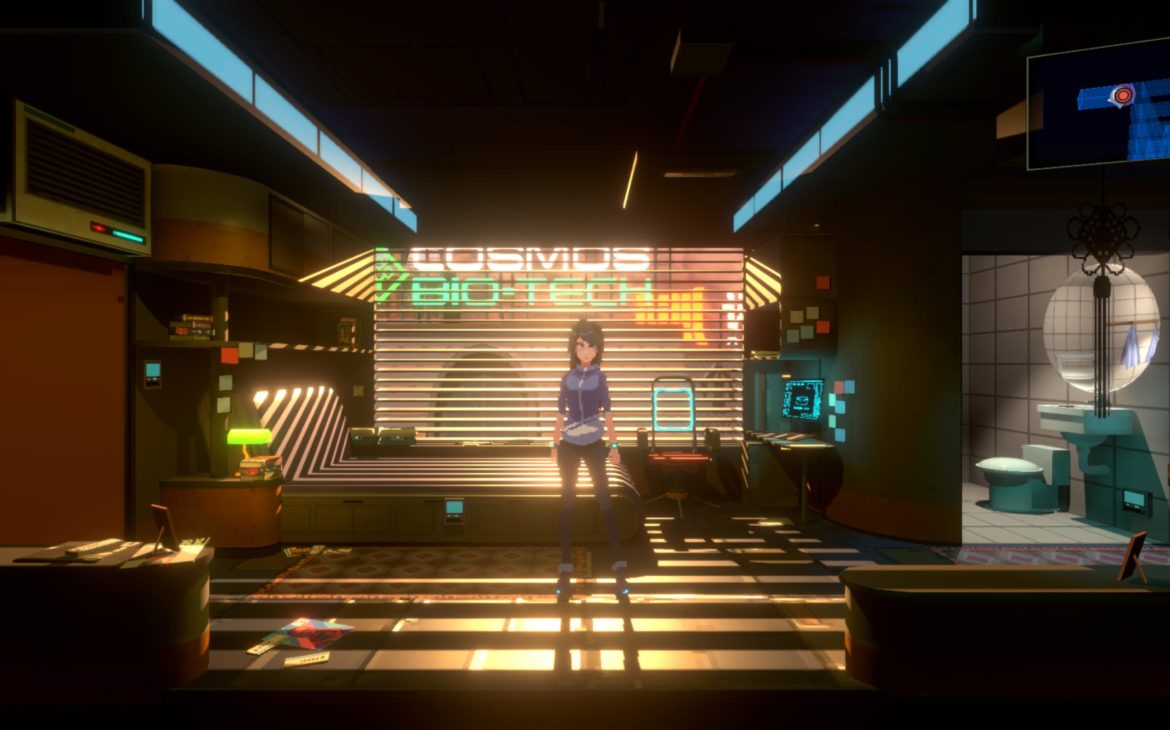
Anno: Mutationem is still a nice-looking game despite the issues we’ve touched on. I like that chunky pixelart, I like the colourful neon side of cyberpunk. There are a few nice areas in the city hubs, and a few nicely lit interiors. The blinds in your room when you first start directly reference Ghost in the Shell’s iconic blinds and you can click the controls and let the neon of the city brighten up your apartment. Truly beautiful lighting effects.
Some of the game is voiced, presumably scenes the writers thought were most important to the plot. For the most part, the two leads, Ann and Ayane, are good, but the rest of the NPCs that deign to enter the conversation, maybe shouldn’t have.
Be aware there are some glitches, but I know the team at Thinking Stars is working hard on them. I had one where I was dropped out of the game back to the PS5 OS. It was usually caused by trying to go to a quest marker I wasn’t meant to yet. Make sure to click on the red quest marker if you get this issue, it solved it for me so that I could continue to progress.
The most annoying glitch was that often an enemy, or in the worst case, a boss’ health bar would not appear, leaving you completely in the dark over how well you are doing against them, whether you are having any effect at all. This happened constantly, but never in any pattern I could discern. Hopefully, it’ll get patched out.
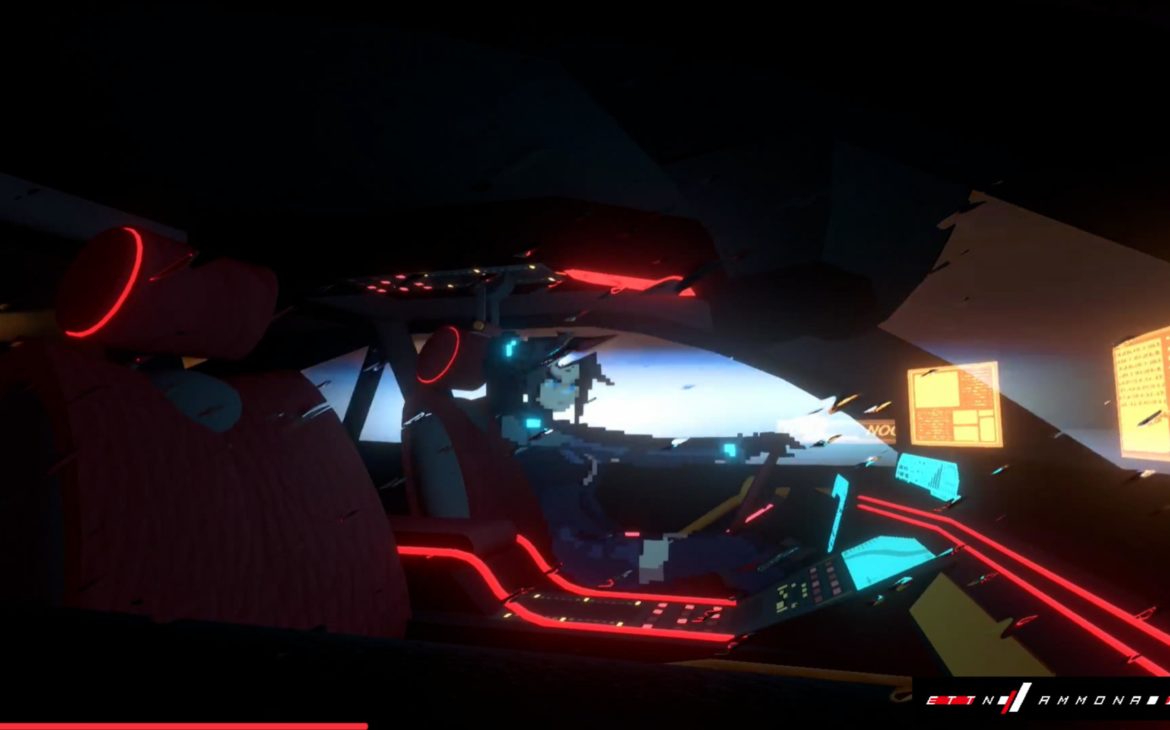
I wanted to love Anno: Mutationem. That 2D on 3D style, the cyberpunk aesthetic, the promise of an interesting plot to discover; the trailer had me convinced. Instead, the game struggles to push forward a coherent plot, rarely if ever addressing the interesting parts of the world it’s created. The exploration aspects leave much to be desired, with poor quests, mountains of unnecessary items and a closed-in feel to areas that needed more freedom. Even the areas that are included needed to be more built upon, busier and more claustrophobic. Combat is fast and responsive, but also simple and bosses regularly devolved into repetitive hand-injury-inducing patterns that were difficult because of how long they lasted.
Anno: Mutationem has promise, but even with a soft eye and a forgiving attitude, it regularly disappoints.
As a cyberpunk adventure Anno: Mutationem lacks much coherent or satisfying plot but its responsive combat will stand out and entertain through its short playtime. It’s just a shame the overall package doesn’t live up to the promise of those stylish trailers.

Anno: Mutationem is available now on PS4, PS5 (review version) and PC via Steam.
Developer: Thinking Stars
Publisher: Lightning Games
Disclaimer: In order to complete this review, a copy of the game was purchased. For our full review policy, please go here.
If you enjoyed this article or any more of our content, please consider our Patreon.
Make sure to follow Finger Guns on our social channels –Twitter, Facebook, Twitch, Spotify or Apple Podcasts – to keep up to date on our news, reviews and features.
